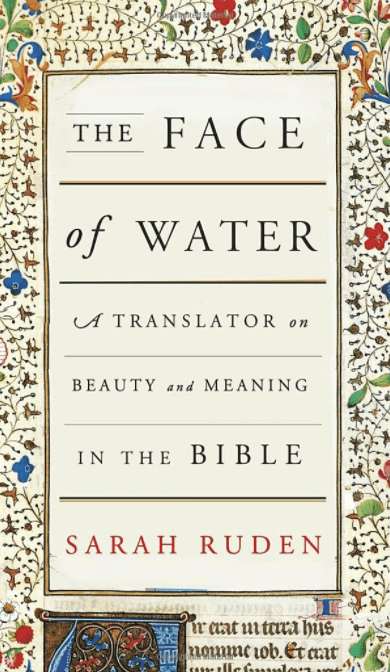 Seriously, her book on Paul — Paul Among the People — was a gem, she has become well known among classicists for her translations, and now she has a splendid new, beautifully written (her prose is always splendid) book called The Face of Water: A Translator on Beauty and Meaning in the Bible.
Seriously, her book on Paul — Paul Among the People — was a gem, she has become well known among classicists for her translations, and now she has a splendid new, beautifully written (her prose is always splendid) book called The Face of Water: A Translator on Beauty and Meaning in the Bible.
Why should we listen to this Quaker who is a classicist and not a Bible scholar?
But how do I dare try to expound the book? I’m the opposite of a cleric or theologian or philosopher: I’mm a Quaker, which means I’m admonished to speak my own mind plainly and briefly if I feel an undeniable need, but otherwise to search quietly for the Light—in whatever form It happens to take—in other people. Many Quakers (though not myself) stop short of calling themselves “religious.” How can I have the gall to pronounce on the character of Scripture, in the original languages or not?
What’s more, I have no formal qualifications whatsoever as a Biblical scholar—not one degree, not even a single course credit, let alone peer-reviewed publications in scholarly journals, or a teaching post. I can only read the Bible in Hebrew and Greek and give my impressions—all the while remembering that old stricture: “Using a language doesn’t make you an expert on it, any more than spending money makes you an economist.’
But here’s the thing. A few years ago, I stumbled onto Paul of Tarsus s letters as the subject of a book and began to research Biblical Greek. I experienced then—the biggest surprise of my life—that I could really be of use. The experience grew more convincing at Yale Divinity School, where I received generous instruction in Hebrew. The Bible, I recognized, was a book that profoundly mattered, more even than ancient pagan literature (in which I do have qualifications). For all of us, it is near at hand in modern culture, though wildly far off in its origins, and we all to some degree define ourselves in relation to it, whether we mean to or not. I developed an ambition that found steady encouragement among clergy, studious laypeople, and people with no extensive background in the Bible but a desire to learn more. I would read in the original languages some of the best-known passages of the Bible and describe what I saw and heard there.
She has one of the more interesting fast-paced introductions to the Bible, beginning with this question:
How, then, did the Jews come to establish the greatest, most enduring book on earth?
Its parts and subjects and overlaps and repetitions and all tied to Hebrews and then Israelites and to Jews — the terms morph along:
The Hebrew Bible is therefore a highly unusual outgrowth of nationalism, if the word “nationalism” even applies. The typical emblematic literature of a nation, from Homer to Vergil’s Aeneid to ‘The Battle Hymn of the Republic” and beyond, says, “We conquer and rule because of special divine favor.” The Hebrew Bible says, “God’s favor punishes and teaches us; it is only through his mercy and justice that we survive, and we survive to testify to this.”
Here’s a brief on the New Testament era:
On the evidence, the most influential disciples and apostles would have been glad to remain within the Jewish sphere, but they would not give up their conviction that Jesus, a shamefully crucified troublemaker, had risen from the dead and so must be the Messiah (“Anointed One”), the savior sanctified by God. The doctrine, of which the first evidence lies in the Jewish Paul of Tarsus’s letters, that this miracle vouchsafed eternal life for all believers, both Jews and non-Jews, made enemies of the Jewish hierarchy, particularly because all the immemorial ritual and moral identifiers of Jews—most important, circumcision and the dietary and sexual laws—were now supposed to be of no essential value, or even inimical if they got in the way of pagans’ converting to the worship of Christ (the Greek translation of “Messiah”).
The whole process of gathering all these books into one Bible, truth be told, is not miraculous but rather mundane, and there’s some truth here but not all of it:
On the whole, the development of the Bible seems to have been more about popular favor than institutional authority: people knew what they liked and discarded what they didn’t, on criteria not too hard to project backward from our own tastes.
Ruden doesn’t bow to political pressure about the gnostic stuff:
It therefore doesn’t surprise me that Gnostic writings didn’t survive a ban; in my (admittedly not universal) opinion, they wouldn’t have survived the most extravagant publicity, simply because then everybody would have known what they said. I’m supposed to ooh and aah over the Gnostic Gospels and deplore their “censorship.” I don’t.
Or to quaint reverential language about the Bible:
The Old Testament Book of Ecclesiastes or Kohelet (something like “Preacher”) is pretty nihilistic, the Song of Songs quite erotic, and in Job, God has all the benevolence of a psychologist experimenting on animals. But these are really ravishing works, and I would have fast-talked them into acceptance as vigorously as their advocates apparently did. … The more you look at what’s known and logically inferred about the process, the less solid appear the old (and new) stories of canonical inquisition for the sake of official self-interest.
On the bias of translators, let her have the last word:
That societies pulled the translation along with them, so to speak, making sure it reflected their own current concerns more and the concerns of the texts’ long-gone originators less, should be surprising to nobody and is blameworthy only in the eyes of perfectionist prigs. Nor, being a translator myself, am I inclined to join the pretentious whining about the aesthetic inferiority of translations to original texts. Yes, newer versions in alien languages aren’t as lovely. And humanity is fallen, and the U.S. Congress is self-serving.
If you don’t read Sarah Ruden, you should. Begin with this book. You’ll rise up and call me blessed.
Have the best Thursday of your life!












